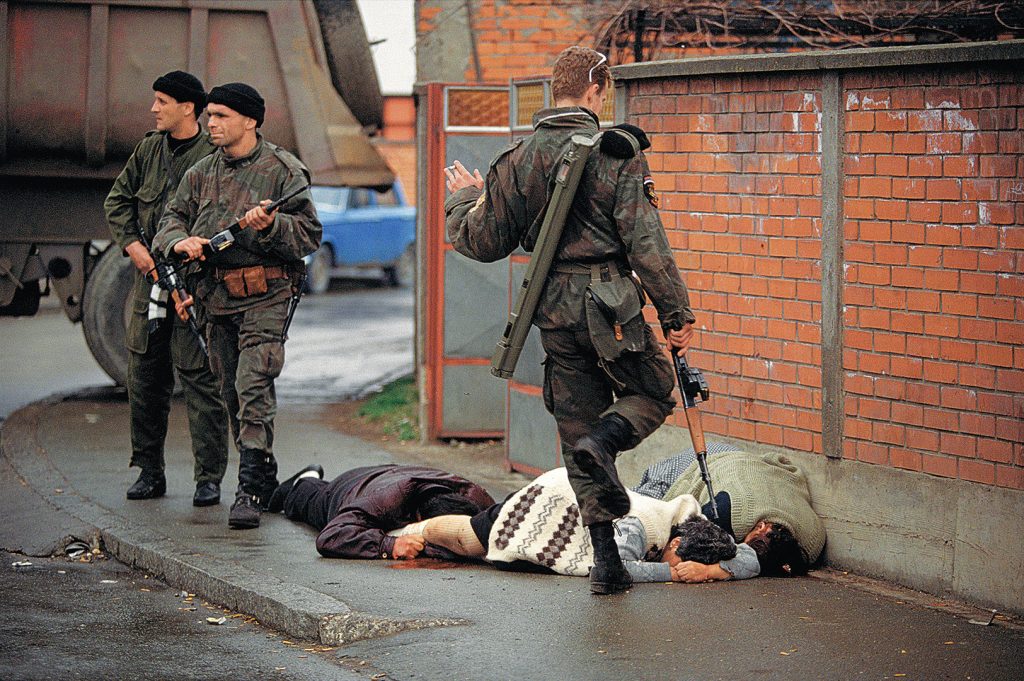When determining the nature of a war, we often look at the events leading up to it. Whether it be economic instability, political inaptness, or social and cultural determinants, it can be figured out. However, approximately 25 years ago, the Bosnian War was not considered a genocide, due to the severity of the conflict and the implications that the term genocide carried at the time. By definition, a genocide is “the deliberate and systematic destruction of a racial, political, or cultural group.”1 In this state, however, genocide failed to be the term used to describe the atrocities that occurred during the Bosnian War. Instead, the term ethnic cleansing was utilized as a facade to divert the public from the real problem of this war. And indeed, the cover-up worked for a few years. Nonetheless, the debate whether Bosnia was suffering a genocide or simply ethnic cleansing still existed well after the war ended. So, the question remains, did Bosnian Serbs ever engage in genocide? And if so, why did the U.S. delay its response to aid Non-Serb Bosnians in this time of crisis?
In June of 1991, prior to the war’s beginning, Bosnia held a referendum on independence and voters chose to secede from Yugoslavia. Slobodan Milosevic was one of the Serbian Presidents of Bosnia at the time. Convinced by their leader, Bosnian Serbs chose to separate from Bosnia as well and create their own state within Bosnia.2 This was not agreed to by all Bosnians, but Milosevic was persistent and manipulated the political, or national, identity of Bosnia. By this year, Bosnia’s population consisted of 44 percent Bosniak, 31 percent Serb, and 17 percent Croatian.3 Nonetheless, Serbs wanted to dominate Bosnia. Milosevic utilized a method similar to Hitler’s, in which he made Serbs appear the dominant race in Bosnia. He emphasized the difference in religion, which was a crucial component of each group’s identity. Serbs were practitioners of Orthodox Christianity, whereas other Bosnians largely practiced Islam.4

Any group that did not belong to the Serbian religion was then utilized as a scapegoat by Serbs in order to highlight their inferiority. The conflict began with demeaning slurs and escalated into violent hate crimes. Serbs wanted to make Bosnia homogeneous, so they took to military action. Additionally, they had an advantage because they obtained their arsenal from the “Serb-dominated Yugoslav National Army.”5 By 1992, this became what some considered to be a Civil War taking place between Bosnia’s different ethnicities. However, the reality was that Serbs were systemically killing off Non-Serbs living in Bosnia. These Non-Serbs consisted of Croats and Muslim Bosnians.
Initially, the Bosnian War, as most countries called it at the time, was deemed a war between different ethnicities, where Serbs were just trying to reclaim the land they believed to be rightfully theirs. The Yugoslavian army was Serb-dominated, and it therefore backed all Serbian procedures at the instruction of Slobodan Milosevic.6 Edicts, or official orders, were issued by the Serbian war presidency. In Celinac, a northern Bosnian town, this began by imposing a curfew on Non-Serbs from 4 p.m. to 6 a.m. Moreover, Non-Serbs were not allowed to:
“meet in cafes, restaurants, or other public places, bathe or swim in the Vrbanija or Josavka Rivers, hunt or fish, move to another town without administration, carry a weapon, drive or travel by car, gather in groups of more than three men, contact relatives from outside Celinac (all household visits must be reported), use means of communication other than the post office phone, wear uniforms: military police, or forest guard, nor sell real estate or exchange homes without approval.”7
Local factories “introduced quotas to limit the number of Muslim or Croat employees to 1 percent of the overall workforce.”8 In Eastern Bosnia, they forcibly evicted Non-Serbs from their towns, often with no warning. By the end of 1993, the Serbs controlled close to three-fourths of Bosnia.9
This was how the Serbs turned to ethnic cleansing, which was considered “the expulsion of a group of people from a geographical area and not the actual physical destruction of that group.”10 Serbs followed the idea of “Say nothing; do these things; do not describe them” as Holocaust historian Raul Hilberg put it. This was the general idea when genocide was practiced.11

That was the reality that many countries, including the United States, refused to recognize. The Bosnian War of 1991-1995 was, in fact, a genocide. This became clear with the Srebrenica Massacre, one of three towns that the Bosnian government still had control over. The United Nations had placed peacekeeping forces here in 1993 in order to protect Non-Serb Bosnians fleeing from the war. These forces, however, were not enough when the Serb army forced its way into the town.12 Srebrenica was the place where Serbs crossed the line between ethnic cleansing and genocide, “the deliberate and systematic destruction of a racial, political, or cultural group.”13 Serbs systematically exterminated Non-Serbs by taking Bosnian women and girls and placing them in concentration camps. In these concentration camps, these females were stripped of their dignity and rights. They were raped and sexually assaulted often until they became impregnated with Serbian seeds. This was done with the aim to eliminate the Bosnian race and to increase the Serb population.14 As for the male Bosnians, sometimes Serb forces “forced fathers to castrate their sons or molest their daughters.”15 All the men, ranging from newborns to the elderly, were either killed on the spot or taken to mass murder sites to be executed. The murders committed towards Bosnians in Srebrenica range between seven and eight thousand. No matter the action, Serbs had a deliberate policy of destruction and degradation to ensure that the Non-Serbian Bosnians knew that they were below the Serbian race.16
“The purging of Non-Serbs was not only an explicit war aim of Serb nationalists; it was their primary aim.”17

Through this massacre, Serbs participated in war crimes as well as crimes against humanity. War crimes are the violation of laws of war, which was done because Serbs killed prisoners of war.18 Crimes against humanity is the mass killing of a large number of the civilian population, and “a form of genocide that occurs during wartime.”19 Genocide focuses on the mass killing of a particular group, which in this case was the Non-Serb Bosnians.
In 1995, the Srebrenica Massacre, along with the Sarajevo market bombing, finally caught the attention of international forces. Humanitarian intervention took place. The United States along with the North Atlantic Treaty Organization (NATO) aided Bosnian and Croat forces by bombing Serb positions as well as providing a ground offensive. This led to Milosevic agreeing to enter peace negotiations hosted by the U.S., which “resulted in the creation of a federalized Bosnia divided between a Croat-Bosniak federation and a Serb republic.”20
But why did it take the United States four years of the Bosnian War and Serbians demeaning other Bosnians to intervene in the war? The U.S. was aware of this genocide occurring and made no advance to aid Bosnia until it was too late and thousands died. At the time, they claimed they never realized the war was actually a genocide occurring. Instead, they looked to the European Union to fix the problem. However, well into the Balkan Wars, European weaknesses were exposed. Still, the U.S. decided to rely on European Union to claim responsibility in a solution to the Bosnian War, knowing that their leadership was nonexistent. Essentially, they appeared to avoid any sort of involvement in Bosnia. They just stood by, allowing it to happen.21
In our day and age, we tend to have a clear idea of the term “genocide.” However, in 1991, when the Bosnian War was just beginning, the United States did not step up to its title of a global leading power. They did not attempt to stop Serbians from first demeaning and subjugating other Bosnians, then killing several thousands of them due to oblivion from the U.S.’s part. It is important to define situations for what they are, rather than hiding behind terms due to the fear of their power.
Today, we see the Bosnian War as what it was, the Bosnian Genocide. The Serbian Army in Bosnia participated in terrorism, ethnic cleansing, as well as genocide against Non-Serbs.
- The Encyclopedia of Criminology and Criminal Justice, 2014, s.v. “Genocide,” by Laurence A. French. ↵
- Samantha Power, A Problem From Hell (New York, NY: Basic Books, 2002), 247. ↵
- “Bosnian Genocide,” History.com, August 21, 2018. Accessed November 20, 2018. https://www.history.com/topics/1990s/bosnian-genocide. ↵
- Tony Barber, “The Bosnian Crisis: Serbs, Croats and Muslims: who hates who and why,” Independent Minds UK, August 9, 1992. Accessed November 20, 2018. https://www.independent.co.uk/news/world/the-bosnia-crisis-serbs-croats-and-muslims-who-hates-who-and-why-tony-barber-in-zagreb-traces-the-1539305.html. ↵
- Samantha Power, A Problem From Hell (New York, NY: Basic Books, 2002), 249. ↵
- “Bosnian Genocide,” History.com, August 21, 2018. Accessed November 20, 2018. https://www.history.com/topics/1990s/bosnian-genocide. ↵
- Samantha Power, A Problem From Hell (New York, NY: Basic Books, 2002), 250. ↵
- Samantha Power, A Problem From Hell (New York, NY: Basic Books, 2002), 250. ↵
- “Bosnian Genocide,” History.com, August 21, 2018. Accessed November 20, 2018. https://www.history.com/topics/1990s/bosnian-genocide. ↵
- “Bosnian Genocide,” History.com, August 21, 2018. Accessed November 20, 2018. https://www.history.com/topics/1990s/bosnian-genocide. ↵
- Samantha Power, A Problem From Hell (New York, NY: Basic Books, 2002), 249. ↵
- “Bosnian Genocide,” History.com, August 21, 2018. Accessed November 20, 2018. https://www.history.com/topics/1990s/bosnian-genocide. ↵
- The Encyclopedia of Criminology and Criminal Justice, 2014, s.v. “Genocide,” by Laurence A. French. ↵
- Leona Pallansch, “Identity Politics, Subject Bosnian War,” (Lecture, Introduction to Global Affairs, St. Mary’s University, October 29, 2018). ↵
- Samantha Power, A Problem From Hell (New York, NY: Basic Books, 2002), 251. ↵
- Samantha Power, A Problem From Hell (New York, NY: Basic Books, 2002), 301. ↵
- Samantha Power, A Problem From Hell (New York, NY: Basic Books, 2002), 251. ↵
- The Columbia Encyclopedia, 2018, s.v. “war crimes,” by Paul Lagasse. ↵
- The Encyclopedia of Criminology and Criminal Justice, 2014, s.v. “Genocide,” by Laurence A. French. ↵
- “Bosnian Genocide,” History.com, August 21, 2018. Accessed November 20, 2018. https://www.history.com/topics/1990s/bosnian-genocide. ↵
- Samantha Power, A Problem From Hell (New York, NY: Basic Books, 2002), 323-327. ↵



53 comments
Octaviano Ibarra
I was not aware of any of the events going on in Bosnia and wow was this tough to read. Even the images chosen were horrific and powerful o a display on what went on that I’m sure not only myself, but many others weren’t aware of. What was also very surprising was that there was not much major concern over a few years because of how blind many were to the fact a genocide was happening and someone could have stopped it sooner.
Audrey Uribe
I was unaware of the Bosnian War or any of the crime surrounding it. After reading it I am appalled by the horrifying actions taken. This stuff happens more than we are aware of and it is unacceptable that no attention is drawn to it. I just read another article about Raphael Lemkin whom single handedly stood against genocide and influenced millions. Amazing article
Saira Locke
Topics such as these are very hard to talk about, but this article explained the situation in a very professional and respectful manner. It is sad to think that things like this have happened in our worlds history and are sadly still happening to this day. This reminded me of the horrific Jew genocide known as the holocaust by capturing victims and torturing them.
Andrea Degollado
I had never heard of these events prior to today. It is truely horrifying to read all these events and no one did anything. It a tragic thing to read about people to be killed or taken out of their home simply because they are not the same as others. This event is very similar, in my opinion, to the Nazi event. Although this being a very well and informative topic, these events are truly horrifying.
Jacob Silva
I have only recently heard brief mentions of the Bosnian Genocide so I had limited knowledge with what happened, but this article cleared that up with its detailed information. I also like how this article is based around a question being if it was genocide or was it war. After reading about the atrocious actions that were made, I must say this was genocide.
Mia Correa
Genocide is a terrible terrible thing to do. When a government has the power to persecute and control their citizens, it is everyone else job to step in. When you see an abusive relationship, you have to say something. It’s the right thing to do. So why would the United States not step in when they see this genocide happening right in front of their eyes? This tends to be a common theme for the United States. We preach about human rights, yet we standby when we see those human rights being abused.
Bruno Lezama
It is the first time that I read about the Bosnian War and all the terrible things that happened in this war. After reading this article, I believe too that this conflict was not a war. Instead of that, this war was a genocide were a lot of people died because of Serbs. I was surprised about the rules that not-Serbs had. I think that these rules are terrible for human rights. Also, the photos of this article demonstrate how terrible was the Bosnian War. Good article!
Jose Maria Llano Aranalde
I had never heard of the genocide in Bosnia before. The first picture made me want to look further into the article. The fact that they tried to change or give this a different definition instead of genocide is crazy to me. They were specifically targeting specific groups of people and protecting others. Also the rules that were made during this time were similar to those in Germany. This article was very well written and taught me a lot over a topic I had no previous knowledge.
Carlos Tami
The events you described were certainly genocide. The quotation with the rules the Non-Serbs had to follow itself gave enough support to the argument. They were secluded from the entire world, monitored, and treated awfully; all acts which almost reflect Hitler’s actions. It is sad to see how these things happen in military dominant countries especially their capability to hide it from the rest of the world. You would hope that people understand we study history to learn from our mistakes and that it is bound to repeat itself. This genocide should have been noticed long before it actually was and should be a wake up call to the big world powers.
Kaleb Werku
Genocide goes beyond war it is what I consider the worst thing a human civilization can do. This article honestly mads me emotionally, the thought of being violently being mutilated and demeaned just because of the ideals you stand for. I am beyond disturbed and frustrated that the United States didn’t step up to prevent this crime against humanity. All we can do now is offer our condolences to the distraught families affected and for the love of God learn from this and not repeat it.